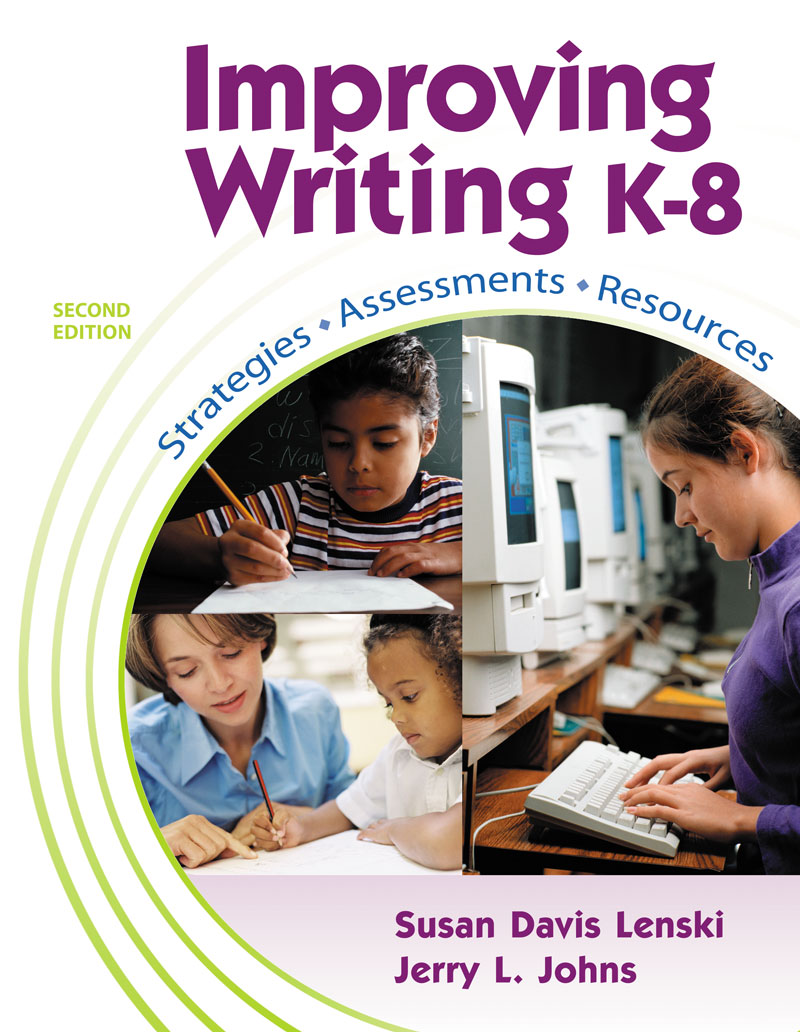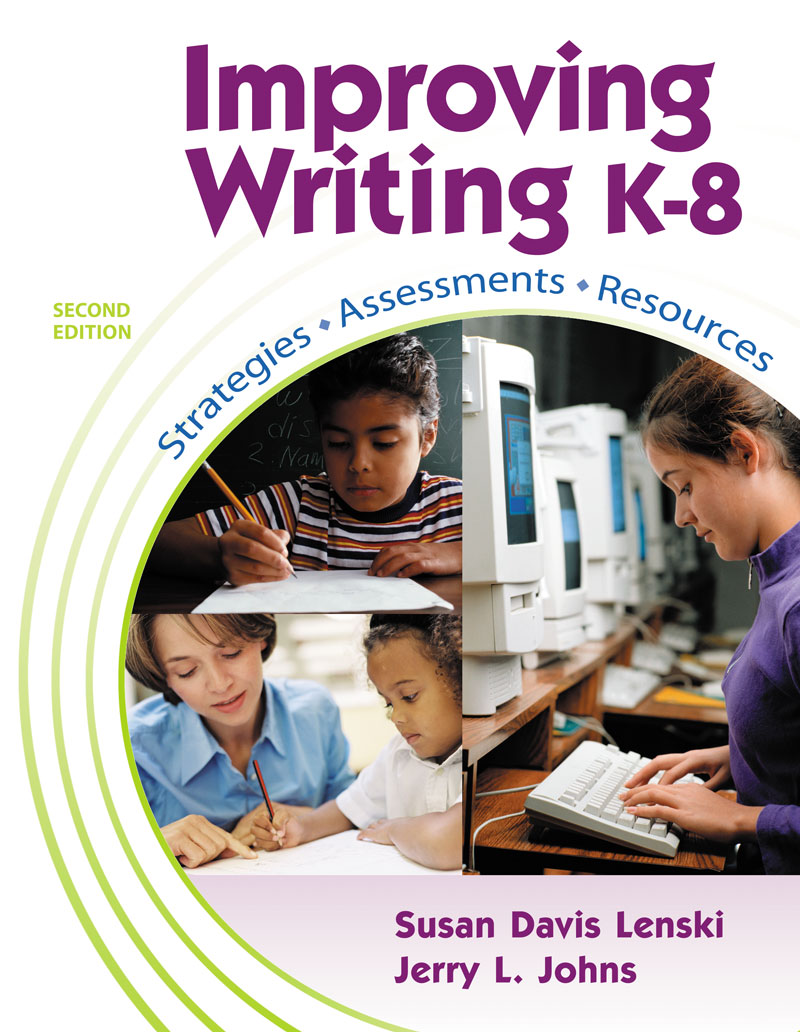Improving Writing K-8: Strategies, Assessments, Resources
Author(s): Susan Lenski , Jerry Johns
Edition: 2
Copyright: 2004
Pages: 408
Improving Writing: Resources, Strategies, and Assessments, by well-known and trusted authors Susan Davis Lenski and Jerry L. Johns, provides teachers with all the background they need to help students improve their writing skills.
A variety of strategies, assessment ideas, and resources will meet diverse student needs. A quick reference guide helps educators choose a goal and identify possible strategies to teach. Each goal gives background information, multiple instructional strategies and resources.
- Resources in this book include reproducible student worksheets, transparency masters, teacher and student examples, bolded text items, and technology tips in the form of Web site addresses.
- Strategies throughout the text help students achieve the important life skill of written communication. These strategies and activities are carefully crafted to help students express their thoughts and ideas.
- Assessments in the form of teacher self-assessments, student self-assessments, and rubrics are provided. Practical evaluative ideas, as well as cautions about becoming an audience of one, are given and explained.
This book is grounded in solid knowledge about writing and is appropriate for college and university courses, school district inservices, and staff development programs. Practicing teachers, prospective teachers, and professionals who fulfill special resource roles will appreciate the user-friendly approach of Improving Writing.
Preface
About the Authors
Acknowledgments
Chapter 1 Improving Writing Instruction
Overview
Writing: A Process, an Art, and a Craft
The Writing Process
Recursive Nature of the Writing Process
Contexts for Writing
Balanced Writing Instruction
Writing Synergy
Writing Assessment
A Writing Community
The Importance of the Teacher
Conclusion
Chapter 2 Emergent and Developing Writers
Overview
Introducing Writing
Getting Started
Gaining Independence
Developing Writers
Assessing Emergent and Developing Writers
Chapter 3 Informal Writing: Building Fluency
Overview
Journal Writing
Responding by Writing
Learning through Writing
Assessing Informal Writing
Chapter 4 Process Writing: Identifying Topics, Purposes, and Audiences
Overview
Encouraging Students to Write
Generating Topics
Discovering Purposes
Identifying Audiences
Assessing Motivation and Content
Chapter 5 Writing Genres: Understanding Organizational Patterns
Overview
Personal Experience Stories
Fictional Stories
Expository Writing
Persuasive Writing
Assessing Genre Writing
Chapter 6 Writing Style and Mechanics: Revising and Editing
Overview
Revising Thoughts and Ideas
Developing Style and Voice
Editing to Conform to Standard English
Assessing Writing Style, Voice, and Mechanics
Appendix: Professional Organizations and Agencies
References
Index
Dr. Lenski has been recognized by several organizations for her commitment to education. Among her numerous awards, are the Nila Banton Smith Award from the International Reading Association; she was instrumental in her school receiving an Exemplary Reading program Award from the International Reading Association; and she was inducted into the Illinois Reading Hall of Fame. She is currently on the International Reading Association's Board of Directors.
Dr. Lenski's research interests focus on strategic reading and writing and adolescent literacy. She also conducts research on preparing teacher candidates. Dr. Lenski has conducted numerous inservice presentations in the United States, Canada, Guatemala, the Philippines, and Panama and has presented at many state and national conferences. Dr. Lenski has published more than 60 articles and twelve books.
Jerry L. Johns has been recognized as a distinguished teacher, writer, outstanding teacher educator, and popular professional development speaker for schools, school districts, and conferences. He has taught students from kindergarten through graduate school and also served as a reading teacher. Professor Johns spent his career at Northern Illinois University. He served in leadership positions at the local, state, national, and international levels. He has been president of the International Literacy Association, the Illinois Reading Council, the Association of Literacy Educators and Researchers, and the Northern Illinois Reading Council. He also served on the Board of Directors for each of these organizations as well as the American Reading Forum. Dr. Johns has authored or coauthored nearly 300 articles, monographs, and research studies as well as over 40 professional books. His Basic Reading Inventory, now in the 12th edition, is widely used in undergraduate and graduate classes as well as by practicing teachers.
Improving Writing: Resources, Strategies, and Assessments, by well-known and trusted authors Susan Davis Lenski and Jerry L. Johns, provides teachers with all the background they need to help students improve their writing skills.
A variety of strategies, assessment ideas, and resources will meet diverse student needs. A quick reference guide helps educators choose a goal and identify possible strategies to teach. Each goal gives background information, multiple instructional strategies and resources.
- Resources in this book include reproducible student worksheets, transparency masters, teacher and student examples, bolded text items, and technology tips in the form of Web site addresses.
- Strategies throughout the text help students achieve the important life skill of written communication. These strategies and activities are carefully crafted to help students express their thoughts and ideas.
- Assessments in the form of teacher self-assessments, student self-assessments, and rubrics are provided. Practical evaluative ideas, as well as cautions about becoming an audience of one, are given and explained.
This book is grounded in solid knowledge about writing and is appropriate for college and university courses, school district inservices, and staff development programs. Practicing teachers, prospective teachers, and professionals who fulfill special resource roles will appreciate the user-friendly approach of Improving Writing.
Preface
About the Authors
Acknowledgments
Chapter 1 Improving Writing Instruction
Overview
Writing: A Process, an Art, and a Craft
The Writing Process
Recursive Nature of the Writing Process
Contexts for Writing
Balanced Writing Instruction
Writing Synergy
Writing Assessment
A Writing Community
The Importance of the Teacher
Conclusion
Chapter 2 Emergent and Developing Writers
Overview
Introducing Writing
Getting Started
Gaining Independence
Developing Writers
Assessing Emergent and Developing Writers
Chapter 3 Informal Writing: Building Fluency
Overview
Journal Writing
Responding by Writing
Learning through Writing
Assessing Informal Writing
Chapter 4 Process Writing: Identifying Topics, Purposes, and Audiences
Overview
Encouraging Students to Write
Generating Topics
Discovering Purposes
Identifying Audiences
Assessing Motivation and Content
Chapter 5 Writing Genres: Understanding Organizational Patterns
Overview
Personal Experience Stories
Fictional Stories
Expository Writing
Persuasive Writing
Assessing Genre Writing
Chapter 6 Writing Style and Mechanics: Revising and Editing
Overview
Revising Thoughts and Ideas
Developing Style and Voice
Editing to Conform to Standard English
Assessing Writing Style, Voice, and Mechanics
Appendix: Professional Organizations and Agencies
References
Index
Dr. Lenski has been recognized by several organizations for her commitment to education. Among her numerous awards, are the Nila Banton Smith Award from the International Reading Association; she was instrumental in her school receiving an Exemplary Reading program Award from the International Reading Association; and she was inducted into the Illinois Reading Hall of Fame. She is currently on the International Reading Association's Board of Directors.
Dr. Lenski's research interests focus on strategic reading and writing and adolescent literacy. She also conducts research on preparing teacher candidates. Dr. Lenski has conducted numerous inservice presentations in the United States, Canada, Guatemala, the Philippines, and Panama and has presented at many state and national conferences. Dr. Lenski has published more than 60 articles and twelve books.
Jerry L. Johns has been recognized as a distinguished teacher, writer, outstanding teacher educator, and popular professional development speaker for schools, school districts, and conferences. He has taught students from kindergarten through graduate school and also served as a reading teacher. Professor Johns spent his career at Northern Illinois University. He served in leadership positions at the local, state, national, and international levels. He has been president of the International Literacy Association, the Illinois Reading Council, the Association of Literacy Educators and Researchers, and the Northern Illinois Reading Council. He also served on the Board of Directors for each of these organizations as well as the American Reading Forum. Dr. Johns has authored or coauthored nearly 300 articles, monographs, and research studies as well as over 40 professional books. His Basic Reading Inventory, now in the 12th edition, is widely used in undergraduate and graduate classes as well as by practicing teachers.

